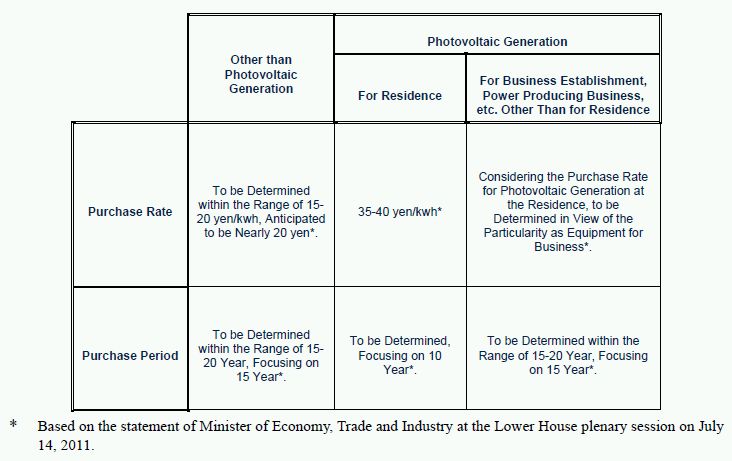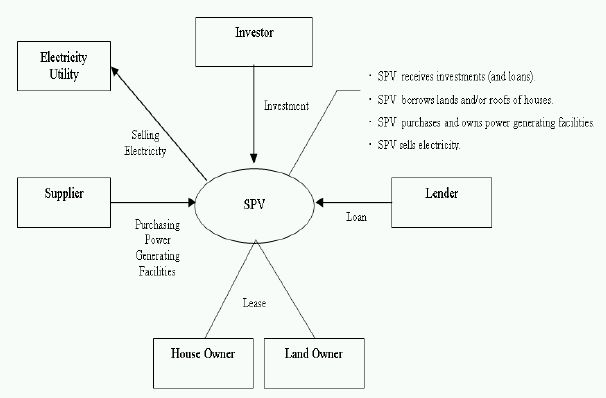- within Criminal Law topic(s)
In Japan, in the wake of the serious nuclear event due to the massive earthquakes and tsunami, the use of renewable energy has been receiving remarkable attention from both public and private sectors. Local governments are keen to promote local production for local consumption of their own electricity through renewable energy rather than building and operating politically and physically hazardous nuclear power plants. Also, many major companies have announced their considerable interest in renewable energy.
In Japan, a system for purchasing surplus electricity exceeding the amount consumed by each renewable energy producer, e.g., a homeowner who installed a photovoltaic facility on the roof of her/his house has existed so far. However, a system for purchasing total amount of renewable energy, which obliges electricity utilities to purchase the electricity generated from mega solar plants and wind power plants established with the purpose of selling electricity, has not been established. As a consequence, Japan has made little progress toward development and expansion in renewable energy.
Now, on August 26, 2011, the Law on Special Measures Concerning Procurement of Renewable Energy Sourced Electricity by Electric Utilities (the "Law") has passed. The Law obliges electric utilities to purchase the total amount, not limited to "surplus," of electricity generated from renewable energy sources at a rate and a period of time set by the government. It is expected that the Law which, except for some provisions, will become effective on July 1, 2012 prompts the use of renewable energy, which is now attracting wide attention in Japan.
1. Outline of the Law
(a) Renewable Energy to be Purchased
Renewable energy which electricity utilities are obliged to purchase under the Law includes photovoltaic, wind, water, geothermal and biomass energy.
(b) Obligation to Accept an Application for an Agreement
Pursuant to the Law, as a general rule, electricity utilities are obliged to accept an application of a renewable energy producer for an agreement under which electricity utilities are supposed to purchase renewable energy.
(c) Obligation to Make Electrical Connection
According to the Law, when a renewable energy supplier asks for the electrical connection between the supplier's power-generating facility and the electricity utility's facility for substation, transmission or distribution, the electricity utility is, in principle, obliged not to reject the electrical connection.
(d) Purchase Rate and Period
The purchase rate and the period of time for purchase will be set by the government. At this writing, they are not yet determined. However, the government has already announced the outline of the envisaged purchase rate and purchase period as the following table1.

(e) Surcharge on Customers
According to the Law, electric utilities are allowed to impose a surcharge on their customers, for the purpose of compensation for the cost of the purchases of renewable energy under the Law. The surcharge is imposed in accordance with the volume of each customer's usage of electricity, and considering the possible increase in burden on companies with large consumption of electricity, the Law gives preferential treatment for those companies.
2. Opportunities for Foreign Companies
Depending on the purchase rate and the period of time for purchase to be determined by the government in the near future, not only Japanese companies but also foreign companies which are now acting or to begin the renewable energy related business in Japan are expected to have the following opportunities. Considering the recent energy crisis in Japan, many companies are very sensitive to the current situations in the renewable energy markets in Japan, and thus, quick and discerning decisions to realize these opportunities are desirable.
The Japanese markets for manufacturers and suppliers of the facilities and equipment for renewable energy would expand. In addition, development in related businesses could be also expected, among others, smart grid related business including installation of smart meters, electric storage related business, electric vehicle related business.
Independent power producing business could be launched in Japan.
Opportunities for an investment in renewable energy would increase. After the implementation of the Law, a fund scheme as following becomes more feasible and practicable. Investors could join in such a fund scheme, as an investor.

Footnote
1 Source: material by Ministry of Economy, Trade and Industry (modified).The table is expected to be subdivided further on the basis of the mode of installation of facilities and the volume of the generation.
The content of this article is intended to provide a general guide to the subject matter. Specialist advice should be sought about your specific circumstances.


